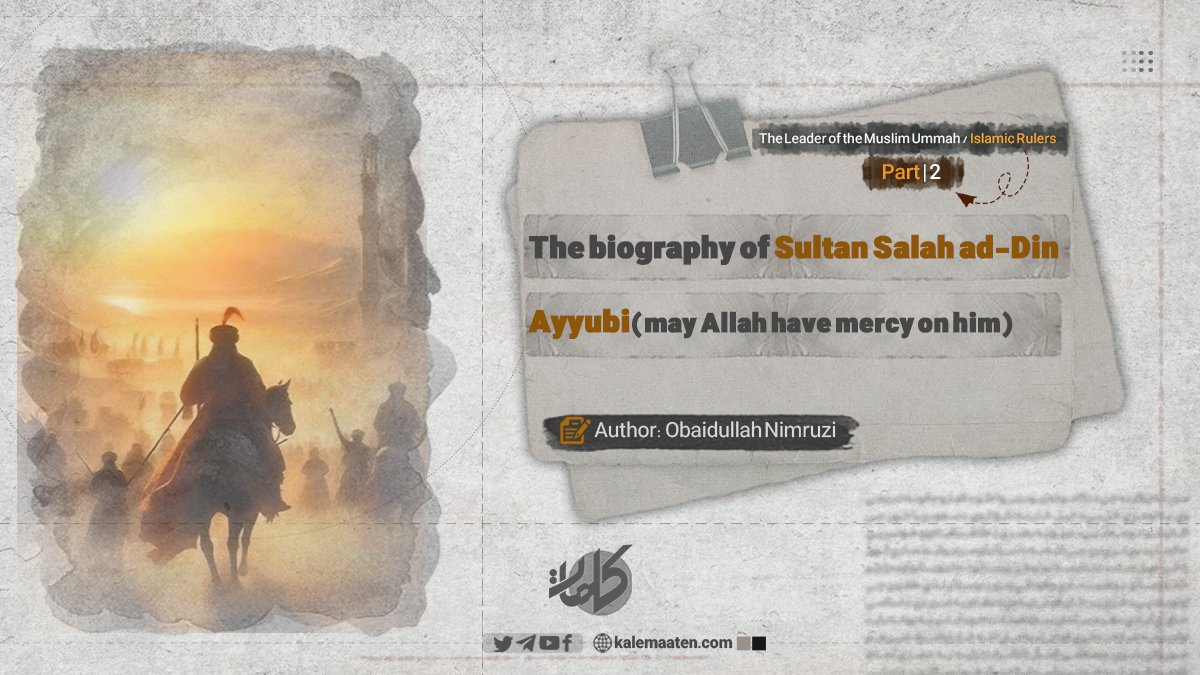
Author: Obaidullah Nimruzi
The Biography of Sultan Salah ad-Din Ayyubi ‘May Allah have Mercy on Him’ (Part Two)
The Crusades and the Threat Against Islam
On one hand, in Baghdad, the center of Islam, intense efforts in authorship and teaching were ongoing. Prominent Islamic scholars were engaged in spiritual reform and the education of the people. On the other hand, clouds of danger were casting shadows over the Islamic world. The existence of Muslims, and even Islam itself, was generally at risk. European Christians had been lurking for centuries, disturbed by the fact that Muslims had taken control of the Eastern countries and held stewardship over all holy places, including the birthplace of Christ. This alone was enough to stir the people’s feelings for revenge. However, as powerful Islamic dynasties advanced towards Christian lands, they did not dare to attack the Muslims.
They could not even look with disdain upon Syria, Palestine, or any other Muslim land. After the decline of the Seljuk Empire and the weakening of the northern borders of the Islamic state, European minds began entertaining ideas of vengeance. Meanwhile, they had gained religious zealots as speakers, such as “Peter the Hermit,” who, with his fiery speeches, incited the Christian world against Muslims. Consequently, a wave of religious fanaticism swept through Christian lands. Additionally, economic and political motives provided further incentives for conflict against the fertile Muslim lands, adding both material and spiritual allure to the Crusades.
As a result, in 490 AH (1096 AD), the first Crusader army set off toward Syria (present-day Syria). Within two years, they captured Edessa, Antioch, Aleppo, and major cities and fortresses. In 492 AH (1099 AD), the Crusader army conquered Jerusalem and, within a few more years, took control of much of Palestine, including the coast of Syria, Antirakos, Acre, Tripoli, and Sidon. As the renowned English historian Stanley Lane-Poole states, “The Crusader army entered the country like an iron pen into dry wood and, in a very short time, shattered the trunk of Islam.”
During the conquest of Jerusalem, in the frenzy of victory, the Crusaders committed atrocities against defenseless Muslims. An English historian recounts that “the Christian army, after victoriously entering Jerusalem, initiated a massacre so severe that it is said that the Crusaders’ horses waded knee-deep in blood on their way to the Al-Aqsa Mosque. Soldiers took children by their feet, smashed them against the walls, and killed them, hurling their bodies over the fortress walls. All the Jews were burned alive in the synagogue. The next day, even more atrocities were deliberately committed. Tikerda had spared 300 captives, but despite his protests, the captives were taken out and killed. Following this, a massive massacre ensued, with the bodies of men, women, and children torn apart, creating piles of remains throughout the area. Finally, the bloody streets of the city were washed by Arab captives.”
The conquest of Jerusalem marked the decline of Islamic rule and the cleverness and resurgence of Christian forces. It was a major alarm for the Islamic world. Four independent Christian states (Jerusalem, Antioch, Tripoli, and Haifa) were established in Syria and Palestine, posing a constant threat to the freedom of Islamic centers (Hejaz). The Christians had grown so bold that Raynald of Chatillon even planned to attack Mecca and Medina, using disrespectful and offensive language regarding the Prophet’s shrine. Indeed, such a grave threat to Islam had not arisen since the apostasy crisis during the caliphate of Abu Bakr (RA). This was the second time Islam faced the threat of complete annihilation, and it became necessary for the Islamic world to prepare for a victorious confrontation.
In the early 6th century, the Islamic world was in a period of disunity and disorder. Malik-Shah Seljuk’s successors were in conflict, and the Abbasid caliphs had long ceded their power to the Ottoman Turks. There was no skilled ruler or competent leader in the Islamic world to reorganize governance, unite scattered Islamic forces, and stand against the impending danger from the north and west. As Stanley Lane-Poole rightly noted, this was a period of confusion and hesitation, as the great Seljuk Empire floundered in its dying moments. Anyone observing this state of affairs would be struck by astonishment. This was a period of chaos, and it was essential for all fragmented forces to come together and move in a unified direction. In essence, this was the reality of the time when Europeans achieved success with their Crusades.
Continues…


